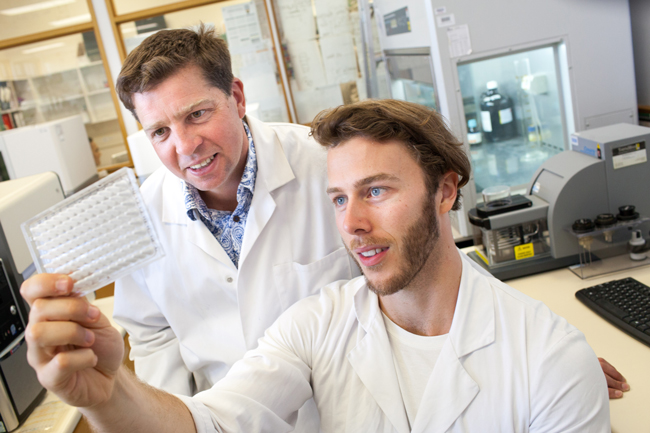
2015 Translational Research grant winners Associate Professor Richard Macknight and PhD student George Taiaroa. Photo: Sharron Bennett.
Otago researchers will use the 2015 Translational Research award to establish a new method to accurately identify changes in DNA.
Associate Professor Richard Macknight, of Biochemistry, and PhD student George Taiaroa will use the $50,000 award from the Division of Health Sciences to build on the new method – preparing it for clinical use and linking with international groups.
“Our aim is to have these tools at the point of care – at hospitals, clinics or even out in the field. This new diagnostic method should provide an affordable and accurate way of achieve this aim,” Associate Professor Macknight explains.
“Making diagnostic tools more accessible could have a major benefits to many people around the globe, particularly in developing regions,” Mr Taiaroa says, citing Tuberculosis, Malaria and emerging viruses as examples of targets that could be analysed using this novel method.
"Making diagnostic tools more accessible could have a major benefits to many people around the globe, particularly in developing regions."
The Translational Research Grant was established to enable research to be converted into products and services to benefit society. Mr Taiaroa, the first student to receive the award, is co-supervised by Associate Professor Macknight and Professor Greg Cook of Microbiology and Immunology – himself a recipient of the Translational Research award in 2013.
Other researchers that have contributed to the success of this project include, Htin Lin Aung of Microbiology and Immunology and, Russell Poulter, Margi Butler, and Anita Dunbier of Biochemistry.
The University's technology transfer unit, Otago Innovation Ltd (OIL), is assisting the scientists with proof of concept and marketing and a provisional patent has been filed.
Translational grant submissions are assessed by a panel of experts comprised of external and internal members who evaluate submissions based on scientific validity, potential societal benefits and how readily the research can be translated, amongst other criteria.
Panel Chairperson and Division of Health Sciences Associate Dean (Research Commercialisation) Professor Ian Tucker says the quality of applicants was “remarkable” and the assessment panel was impressed by the exciting research put forward for review.
“Translating research into products and services that benefit society is a part of the mission statement of the Division of Health Sciences. This grant and the research awarded the funding help stimulate more interest in translation and enhance understanding of how the outstanding research at Otago can impact and benefit society.”
The runners-up for the 2015 Translational Research Grant were Dr Andrew Cridge and Associate Professor Peter Dearden, also of Biochemistry, for their research, which authenticates the composition of honey and validates its origin.
